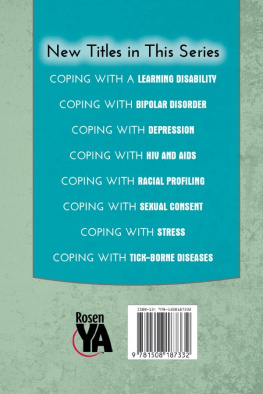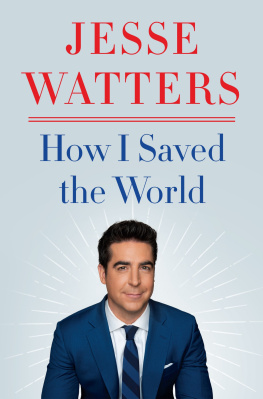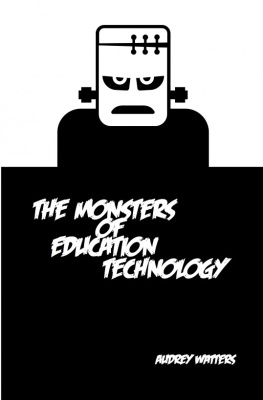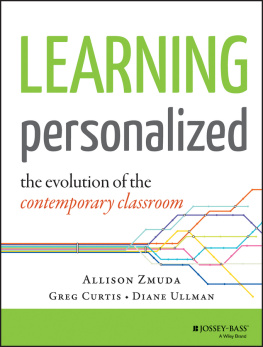Audrey Watters - The History of Personalized Learning
Here you can read online Audrey Watters - The History of Personalized Learning full text of the book (entire story) in english for free. Download pdf and epub, get meaning, cover and reviews about this ebook. year: 2021, publisher: MIT Press, genre: Romance novel. Description of the work, (preface) as well as reviews are available. Best literature library LitArk.com created for fans of good reading and offers a wide selection of genres:
Romance novel
Science fiction
Adventure
Detective
Science
History
Home and family
Prose
Art
Politics
Computer
Non-fiction
Religion
Business
Children
Humor
Choose a favorite category and find really read worthwhile books. Enjoy immersion in the world of imagination, feel the emotions of the characters or learn something new for yourself, make an fascinating discovery.

- Book:The History of Personalized Learning
- Author:
- Publisher:MIT Press
- Genre:
- Year:2021
- Rating:5 / 5
- Favourites:Add to favourites
- Your mark:
- 100
- 1
- 2
- 3
- 4
- 5
The History of Personalized Learning: summary, description and annotation
We offer to read an annotation, description, summary or preface (depends on what the author of the book "The History of Personalized Learning" wrote himself). If you haven't found the necessary information about the book — write in the comments, we will try to find it.
The History of Personalized Learning — read online for free the complete book (whole text) full work
Below is the text of the book, divided by pages. System saving the place of the last page read, allows you to conveniently read the book "The History of Personalized Learning" online for free, without having to search again every time where you left off. Put a bookmark, and you can go to the page where you finished reading at any time.
Font size:
Interval:
Bookmark:
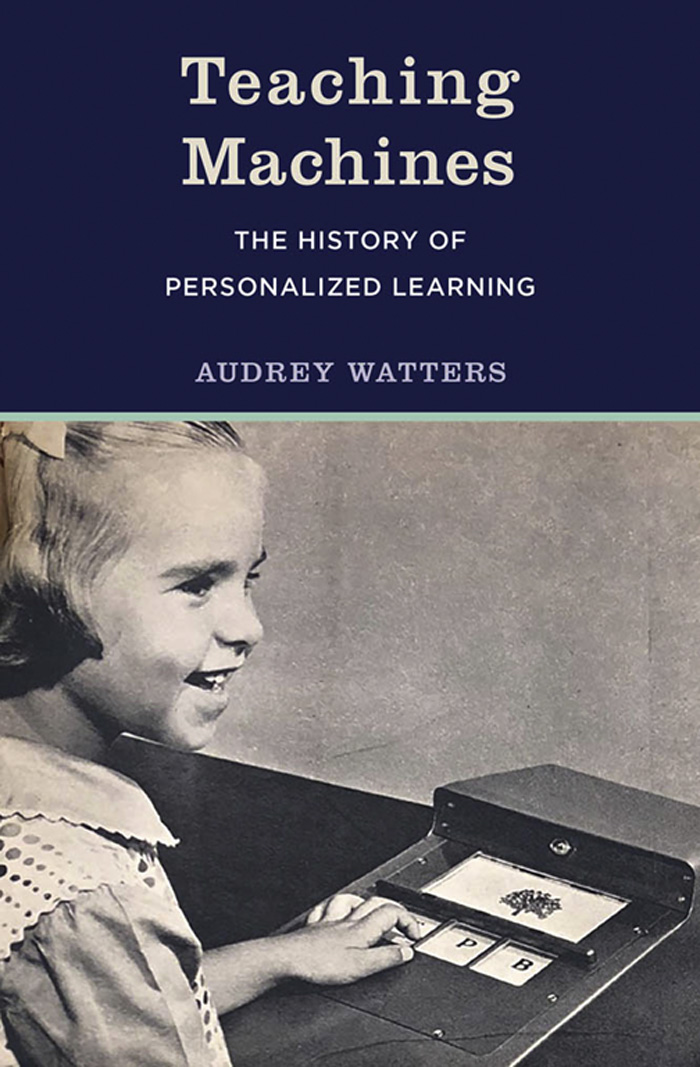
Audrey Watters
The MIT Press Cambridge, Massachusetts London, England
2021 Audrey Watters
All rights reserved. No part of this book may be reproduced in any form by any electronic or mechanical means (including photocopying, recording, or information storage and retrieval) without permission in writing from the publisher.
We have made every effort to trace the rights holder for the cover image. Rights holders may contact us at https://mitpress.mit.edu/contact-us and full credit will be given in subsequent printings.
This book was set in ITC Stone and Avenir by New Best-set Typesetters Ltd.
Library of Congress Cataloging-in-Publication Data
Names: Watters, Audrey, author.
Title: Teaching machines : the history of personalized learning / Audrey Watters.
Description: Cambridge, Massachusetts : The MIT Press, [2021] | Includes bibliographical references and index.
Identifiers: LCCN 2020024477 | ISBN 9780262045698 (hardcover)
Subjects: LCSH: Educational technologyHistory20th century. | Programmed instructionHistory20th century. | Skinner, B. F. (Burrhus Frederic), 1904-1990 | Web-based instructionHistory20th century.
Classification: LCC LB1028.3 .W383 2021 | DDC 371.33dc23
LC record available at https://lccn.loc.gov/2020024477
10 9 8 7 6 5 4 3 2 1
d_r0
For teachers... for human teachers, not teaching machines
If by a miracle of mechanical ingenuity, a book could be so arranged that only to him who had done what was directed on page one would page two become visible, and so on, much that now requires personal instruction could be managed by print.
Edward Thorndike, Education, a First Book (1912)
In 2012, Sal Khan sat down with Forbes journalist Michael Noer and recorded an eleven-minute video on The History of Education as part of the media tour Khan was undertaking to promote his new book, The One World School House. Although he had no formal teacher training, Khan, an MIT graduate and a former hedge fund analyst, had become something of an education celebrity over the course of the previous few years, initially setting out to tutor his cousin in math but eventually expanding his audience by posting a series of short, explanatory videos about all kinds of topics to YouTubevideos that received millions and millions of views. These videos had a decidedly low-budget look and feelmade with a Wacom tablet, using video capture to record Khans screen and voice but never his face or body, as he casually talked through various concepts, drawing graphs and figures with a stylus. Khans videos attracted the attention of Silicon Valley investors and, most notably perhaps, of billionaire education philanthropist Bill Gates, who introduced Khan at the 2011 TED Talks. There, Khan gave a presentation, Lets use video to reinvent education, which has since been watched online almost five million times.
Khans online video-based instruction was almost universally lauded by the press and by pundits. He was described as the savior of education. Bloomberg Businessweek dubbed him The Messiah of Math. Time wondered if Khan was The New Andrew Carnegie. Slate claimed that his folksy lectures are revolutionizing how kids learn math and science. Wired Magazine argued that the nonprofit Khan had formed, Khan Academy, was changing the rules of education. Fast Company, which described him as Bill Gates favorite teacher, cheered Khan Academys potential to disrupt education.
This disruption, as these publications and philanthropists saw it, was meant to upend a public school system that stifles creative inquiry and independent thought; that emphasizes standardization over personalization; that, as Khan claimed in his book (and in the Forbes video), demands students be separated by age into buckets and move to the sound of bells in lockstep. It is a system, they contended, that was established almost two hundred years ago and has not changed since. This industrial model of education, sometimes derided as the Prussian model of education, is inflexible and outmoded and, as such, requires sweeping technological upgrades.
Khans History of Education video credits Horace Mann with importing this model to the United States in 1840. Just thirty years later, Khan explains, you get to a situation where public education is actually fairly commonplace, although, admittedly, hardly standardized in any way. To address geographic discrepancies, Khan narrates, in 1892... you had a Committee of Ten. Sounds somewhat Orwellian, the Forbes journalist quips. Somewhat Orwellian, Khan echoes in agreement, but it is literally ten gentlemen, led by the President of Harvard, to determine what should happen in schools. It was actually this Committee of Ten that decided there should be twelve years of compulsory education, Khan explains, and that decreed what subjects students must take in their junior or senior year of high schoolindeed, that you should even have this notion of high school at all.
So this is standardization, Noer adds, summarizing Khans points. We have now a public standardized education.... It was forward thinking for 120 years ago, he says, but what is interesting here is that we basically get stuck there. Khan agrees. Education, he says, is static to the present day.
Until the computer, the internet, and Khan Academy came along, that is. Khan and Noers historysketched on a timeline Khan calls the sweep of timeskips from the the 1890s to the 1990s. Now, says Khan, it is no longer necessary to batch everyone into these buckets. Everyone can go at their own pace, get feedback at their own pace.... Class time can be liberated.
For the very first time, technology will make the classroom more human, more interactive and free from the Prussian model of schooling. For the first time in the history of education, as Khan and Noer tell it, learning will be personalized.
Theres at least one problem with the way Khan tells it: the history is all wrong.
When the industrial model gets invoked in discussions about educational politics and policies, the phraseintentionally or notglosses over and distorts history. Prussia was hardly industrialized in 1763 when Frederick the Great founded the countrys public education system. Prussia lagged behind other parts of Europecertainly behind Britain, which did not have a public school system at the timein industrializing its economy.
One of the key features of the Prussian education system wasas Khan notes correctly in his Forbes videothe collection of taxes to pay for free schooling. But arguably the most important featureand the one that education reformer Horace Mann was keen on when he visited Prussia in 1843was that teachers should be professionals, trained in specialized colleges. It is striking that this partthe professionalization of educatorsgets erased from the story Khan relates.
Granted, some of that erasure comes with the pace at which Khan moves through his timeline. Its a ten-minute video, after all. Much of his narration is sloppily worded, as part of the schtick of Khan Academy is that its videos appear off-the-cuff and casual. And while tightly scripting a lesson like its a stage production has plenty of drawbacks, how one presents and explores ideas is worthy of care and intentionality, particularly if youre building an intellectual framework for someone else to navigate and rely upon. (The same goes for writers, no doubt.) Words and phrasing matter. The Committee of Ten did not
Next pageFont size:
Interval:
Bookmark:
Similar books «The History of Personalized Learning»
Look at similar books to The History of Personalized Learning. We have selected literature similar in name and meaning in the hope of providing readers with more options to find new, interesting, not yet read works.
Discussion, reviews of the book The History of Personalized Learning and just readers' own opinions. Leave your comments, write what you think about the work, its meaning or the main characters. Specify what exactly you liked and what you didn't like, and why you think so.


